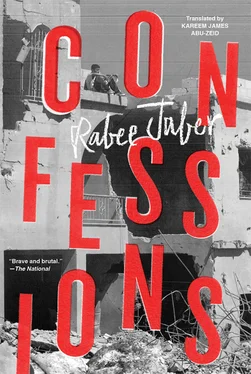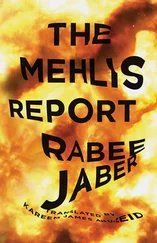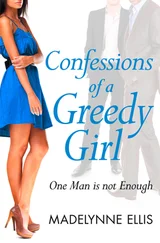On the phone, while I was listening to her speak a mixture of Arabic, French, and English, I wanted to ask her if she remembered how she used to drag me with her to the gates of the embassies: there was a period in the second half of the ’80s when we (just Najwa
and I) used to wake up at dawn, drink our coffee, and then grab a bottle of water and make the rounds of the embassies. One day we’d go to the French Embassy, and the next day to the Canadian one, and the following day to the Australian. And then to the Swiss Embassy, and to the Dutch, British, and New Zealand embassies. There wasn’t a single embassy whose gate we didn’t sit in front of — and after they’d said a few words to us (or sometimes they wouldn’t even say anything), they’d give us some forms and we’d fill out the forms, hand them in, and then they’d give us imaginary appointments. And sometimes we’d actually get a meeting. Then nothing would happen. They’d take our phone number, or they wouldn’t take it. And nothing would happen. And when the Australian Embassy finally accepted Najwa’s application, she changed her mind. I asked her why we’d been standing in all those lines. Why had we stood there and eaten all that melting chocolate while we waited in the hot sun? And she replied: “Now we know it’s possible to leave.”
Was it possible to leave? Would I leave one day? I’m still standing there, in the old kitchen of the Achrafieh house, raising the fork with pumpkin jam and bringing my lips to the fork: the thick substance melts in my mouth as I close my eyes, and incomprehensible memories surge in my depths — what’s down there? Gardens or swamps? A sea or a desert? The memories flood over, images I don’t understand, I don’t know where they’ve come from, and I don’t know what’s happening to me. Do you remember that woman, the one with the round face and the damp blond hair, do you remember that yellow face? Didn’t I tell you that while I was half asleep in the safe room I saw the spark of a lighter in the darkness, and I saw a yellow face in that light (beneath the yellow circle that looked like a halo)? Do you remember? In my dreams, shortly after George Sader began coming to our house, I started seeing that woman, but I didn’t know why. Who was she? Why did I look at her like that? Why was she so important to me? I didn’t know her face from the neighborhood. With the exception of this dark memory from that night in the safe room, I can’t remember ever having seen the woman’s face. Had I seen her in a dream that night, while I slept, covered by a sheet, between my mother and my sisters?
In college, as I studied Saint Augustine (I took that course in my second semester, it too was elective) and read about how memory is a vast palace with many rooms, how there are corridors and cellars beneath the palace, I thought of my mother sitting in the living room, her legs propped up on the small table (we’d moved father’s stone ashtray out of the living room: there was no need for it, since Julia’s fiancé didn’t smoke). I saw my mother, a white sheet covering her legs, and I saw the branches Julia had sewn onto the sheet with green thread. Mary entered carrying cups of lemonade on a tray while my mother gazed at her with that look of love that flooded the world. Mary sat down beside her. Julia and her fiancé were sitting across from them, drinking the lemonade (the cups were cold, covered in condensation — Julia wrapped a Kleenex around her fiancé’s cup). Mary dipped some cake into the lemonade and put it on a plate in front of my mother, on the wooden arm of the sofa.
I’ve told you about my unsettling dreams: a strange series of dreams began disrupting my sleep back then, when Julia was preparing for her wedding. The same dream kept repeating, with some small detail changing each time. That would last a while, then a new dream would come. And then this new dream would be a bit different each time, too. And sometimes the old dream would come back, or the two dreams would blend together. Or a third dream would blend in with the other two, or not blend in and appear as an entirely separate dream, but then afterward I’d think it was like the two previous dreams. It’s not easy for me to remember all the details. But I do remember a number of those dreams and nightmares. What I remember most vividly is the impression they left in my mind, the feeling of disarray and confusion, of incomprehension.
I didn’t know what was happening. The nightmares became so bad that they stayed with me even after I’d woken up. Do you know what I saw? I saw my father attacking me with a knife. Was it my father, or Ilya, or Najwa? I don’t know. The face kept changing. I didn’t know why I was being attacked, I hadn’t done anything. In another nightmare I was on the roof of the house, or on the roof of the school, and I saw Ilya’s face darken as he lifted something heavy off the ground and threw it at me (I don’t know what it was, but it was heavy). He was trying to kill me, and I couldn’t move. I tried to get away, but I was glued to the ground. I’d wake up terrified, my heart pounding, just as the object was about to hit me: I didn’t die in those nightmares, but I was a hair’s breadth away from it.
On the other hand, I also had “dreams” that weren’t nightmares, but these confused me too: I’d see a wooden door that had been painted green. The door had a brass knocker that looked like a claw. I’d hear a familiar voice repeat a name in my ear and ask me to do something (the voice was familiar in the dream, but when I woke up and tried to remember whose it was, I couldn’t). In the dream I knew the voice was saying my name, but it didn’t say “Maroun,” it called me something else, a word I knew was my name, a word that didn’t sound strange, but when I woke up I couldn’t remember it. I could guess what the familiar voice in the dream was asking: it wanted me to reach out my hand and grab the knocker and pull it toward me and then let it slip from my fingers. I knew that, and I’d done it before, and I could do it again. I’d hear the brass strike the wood, and wake up.
JULIA WAS decorating the Christmas tree at our house when my mother died. I remember the clinking ornaments. All of us got together over the Christmas holidays of 1985. We didn’t know that mother would be leaving us, and we didn’t know it would be our last gathering. I remember how Julia hovered around the green pine tree that Ilya had brought in (it was a tall tree that reached the ceiling) and how she took the colored ornaments from Mary. I remember her glowing skin (she was pregnant), and Mary, in a blue dress, barefoot on the carpet, leaning over a burlap sack that we called an “onion bag” (the brown one was a potato bag, the red one was an onion bag). I remember Liliane combing the fur of the European dog she’d received as a gift. And Najwa was in the dining room, buried in exams she’d put off correcting until the final hour. I remember the sound of the radio (the old wooden radio whose base had dug a permanent hole into the dresser). The volume was turned up, and Najwa was calling Liliane but Liliane couldn’t hear her, and Julia was laughing as she wrestled with the branches of the tree.
I remember Ilya coming and going while Julia told him “You can’t smoke here” and the tiny dog made a sound like the meowing of a cat. I remember my mother calling me from her room (my father never came home before evening, and it was still midday). I went into her room and saw that a glass of water had fallen over on the nightstand. She said the glass was empty — or nearly empty — as I picked it up and wiped off the water that had spilled with a tissue. I sat down beside her on the bed. She held my hand, and it was only then that I noticed she wasn’t well.
Читать дальше












